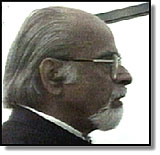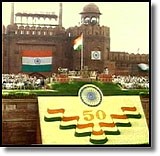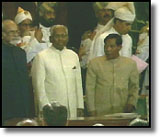
|
Indian Premier's Jubilee Address Highlights CorruptionIndia's Prime Minister, IK Gujral, has addressed the nation from the ramparts of the 17th century Red Fort in Delhi on the golden jubilee of independence.Continuing the theme which dominated a speech by India's new president in parliament on Thursday night, much of Mr Gujral's address was devoted to the need to root out corruption. He said it was the greatest danger facing the country.
He also called on people to report anyone taking bribes, even if they were cabinet ministers, and announced the creation of a special fund for girls in poor families. In a speech to the midnight meeting of parliament, President Narayanan had appealed to citizens to mount a national movement to rid India of corruption and poverty, which he said had marred five decades of freedom. "Here, though we have registered significant successes, the fact of the matter is that we have not been able to abolish poverty, ignorance and disease from among our people," he said. India's celebrations to mark 50 years of independence from Britain were marked in the capital, New Delhi. Patriotic songs were played over public address systems, and children flew kites in the saffron, white and green of the Indian flag. But a bomb attack on a train in the north-east of the country was a stark reminder of the ethnic and class tensions that continue to divide the country.
India's celebrations began as Pakistan's independence festivities drew to a close. Relations between the two countries have been strained since the violence that surrounded Partition in 1947: they have since fought three wars. Just before midnight local time, members of parliament and other dignitaries gathered for a nationally televised re-enactment of the historic sitting of India's constituent assembly the night of August 14, 1947. To start the ceremony, a male vocalist performed India's national song. The audience then heard recordings of famous speeches by the father of the country's independence Mahatma Gandhi and India's first Prime Minister, Jawaharlal Nehru. Nehru's "tryst with destiny" speech delivered moments before midnight, called for an end to "poverty and ignorance and disease and inequality of opportunity".
Referring to Gandhi, Nehru added that "the ambition of the greatest man of our generation has been to wipe every tear from every eye".
India is riven by ethnic and class tensions and has to contend with a number of separatist groups fighting for independence: the north-east is practically cut off from the rest of the country, and there are armed separatists operating in Kashmir in the north, Punjab in the west and Tamil Nadu in the south.
|
Diana, Princess of Wales, 1961-1997
Conference 97
Devolution
The Archive
News |
Issues |
Background |
Parties |
Analysis |
TV/Radio/Web
Interactive |
Forum |
Live |
About This Site
News |
Issues |
Background |
Parties |
Analysis |
TV/Radio/Web
Interactive |
Forum |
Live |
About This Site
© BBC 1997 |
politics97@bbc.co.uk |




